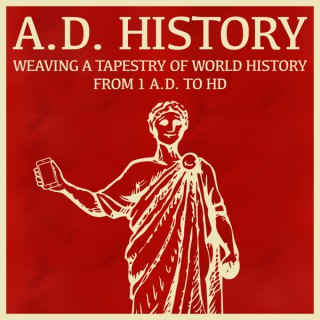Podcasts about palmyrene empire
- 7PODCASTS
- 8EPISODES
- 40mAVG DURATION
- 1MONTHLY NEW EPISODE
- Dec 18, 2025LATEST
POPULARITY
Latest news about palmyrene empire
- Open Access Journal: Pons Aelius AWOL - The Ancient World Online - Oct 21, 2022
Latest podcast episodes about palmyrene empire
Between the years 235 and 280 AD, the Roman Empire was a basket case. Emperors were dropping like flies, succession fights were common, pretenders routinely declared themselves Emperor, and whole regions broke away. It was not the most prestigious period for Rome.In Roman-controlled Syria, a fully Romanized city-state called Palmyra had become a wealthy and prosperous destination on various trade routes, as well as the last bulwark on the eastern frontier between Rome and the Persian Empire. As the Roman crack-up proceeded, the city appointed its first-ever king, Odaenathus, who ruled alongside his wife, Zenobia. When Odaenathus was assassinated in 267 - we don't know by whom - Zenobia took the reins of Palmyra and led it through an audacious territorial expansion, until Palmyra controlled basically all of the Eastern Empire, including Egypt.And then, as more Emperors bumbled through the halls of power in distant Rome, Zenobia gave up on them entirely and declared herself Empress of Rome, and her domain, the Palmyrene Empire, the equal of Rome itself.Listen ad-free at patreon.com/trashyroyalspodcast.To advertise on this podcast, reach out to info@amplitudemediapartners.com.See Privacy Policy at https://art19.com/privacy and California Privacy Notice at https://art19.com/privacy#do-not-sell-my-info.
Between the years 235 and 280 AD, the Roman Empire was a basket case. Emperors were dropping like flies, succession fights were common, pretenders routinely declared themselves Emperor, and whole regions broke away. It was not the most prestigious period for Rome. In Roman-controlled Syria, a fully Romanized city-state called Palmyra had become a wealthy and prosperous destination on various trade routes, as well as the last bulwark on the eastern frontier between Rome and the Persian Empire. As the Roman crack-up proceeded, the city appointed its first-ever king, Odaenathus, who ruled alongside his wife, Zenobia. When Odaenathus was assassinated in 267 - we don't know by whom - Zenobia took the reins of Palmyra and led it through an audacious territorial expansion, until Palmyra controlled basically all of the Eastern Empire, including Egypt. And then, as more Emperors bumbled through the halls of power in distant Rome, Zenobia gave up on them entirely and declared herself Empress of Rome, and her domain, the Palmyrene Empire, the equal of Rome itself. Listen ad-free at patreon.com/trashyroyalspodcast. To advertise on this podcast, reach out to info@amplitudemediapartners.com.
How Truly Gallic Was The Gallic Empire? | 261AD-270AD
For a so-called Gallic Empire splitting from Rome, it's still very Roman. Also, the Palmyrene Empire is also trying to split from Rome itself. The post How Truly Gallic Was The Gallic Empire? | 261AD-270AD appeared first on TGNR.
Restorer of the World: Life and Legacy of the Roman Emperor Aurelian, 270-275
RE-UPLOAD from /GetNuanced on YouTube - Reigning as Emperor of Rome during the climax of the Crisis of the Third Century, Aurelian (c. 270 - 275 AD) despite being of humble origins had risen through the military ranks of the Roman Army to become leader of the Orbis Romanus at a time when its continued existence as a unified, single political state was within question from its contemporary citizenry. With the Germanic Migrations that would become one of the primary staples that characterized the history of the Late Roman Empire (until the very Fall of Rome in the West), said Germanic Tribes from across the Rhine River had gone from manageable nuisances that would periodically raid into the Imperium's frontiers, into fearsome and worthy adversaries which would become increasingly determined to make their way into the very heartlands of Rome and carve a place out within its borders for the various peoples of Germania to call their new homeland. Separatist tendencies that had been long brewing and no longer could be suppressed manifested themselves in the breakaway provinces of both the East and West attempting to severe ties with the Imperium Romanum in the form of the Palmyrene Empire and Gallic Empire, respectively. Despite his untimely death, Aurelian's many achievements would outlive him and his legacy as being Restitutor Orbis (Latin for "Restorer of the World") would inspire the modern cities of Orleans in France and New Orleans in the State of Louisiana in America to be named in his honor. In five short years he did far more than many would and will do in decades. -- NOTE: This was originally published a few months prior on YouTube, over at: https://www.youtube.com/watch?v=tb6MA1dfj4k This is officially the first of what will in time be many segments from GetNuanced via AnchorFM and if you enjoyed tuning in please consider following this Anchor Profile and subscribing to the YouTube channel for video-based exclusives such as clips and behind-the-scenes content which is as relevant as it is worthwhile. Thanks for listening! -- CONNECT WITH US ACROSS THE WEB: TWITTER: http://www.twitter.com/GetNuanced INSTAGRAM: http://www.instagram.com/GetNuanced WEBSITE: http://www.GetNuanced.com/ -- PODCAST TAGS: #AURELIAN #ROMANEMPEROR #HISTORYPODCAST -- STAY SAFE & PEACE OUT, -TJC --- This episode is sponsored by · Anchor: The easiest way to make a podcast. https://anchor.fm/app --- Send in a voice message: https://anchor.fm/getnuanced/message Support this podcast: https://anchor.fm/getnuanced/support
Crisis of the Third Century, written and narrated by Joshua J. Mark: https://www.ancient.eu/Crisis_of_the_Third_Century/ This article was sponsored by Total War and is about the historical background of Total War: Rome II - Empire Divided: - goo.gl/MQzTGR If you like our audio articles, please support us by becoming a member or donating to our non-profit company: - www.ancient.eu/membership/ - www.ancient.eu/donate/ - www.patreon.com/ahe The Crisis of the Third Century (also known as the Imperial Crisis, 235-284 CE) was the period in the history of the Roman Empire during which it splintered into three separate political entities: the Gallic Empire, the Roman Empire, and the Palmyrene Empire. These breakaway empires, as well as the social turmoil and chaos which characterized the period, resulted from a number of factors: a shift in the paradigm of leadership following the assassination of the emperor Alexander Severus (222-235 CE) in 235 CE by his own troops, increased participation by the military in politics, lack of adherence to a clear policy of succession for emperors, inflation and economic depression caused by a devaluation of currency under the Severan Dynasty, increased pressure on the emperor to defend the provinces from invading tribes, the plague which heightened fears and destabilized communities, and larger armies which required more men and decreased the agricultural labor force.
Melvyn Bragg and his guests discuss Queen Zenobia, a famous military leader of the ancient world. Born in around 240 AD, Zenobia was Empress of the Palmyrene Empire in the Middle East. A highly educated, intelligent and militarily accomplished leader, she claimed descent from Dido and Cleopatra and spoke many languages, including Egyptian. Zenobia led a rebellion against the Roman Empire and conquered Egypt before being finally defeated by the Emperor Aurelian. Her story captured the imagination of many Renaissance writers, and has become the subject of numerous operas, poems and plays. With: Edith Hall Professor of Classics at King's College, London Kate Cooper Professor of Ancient History at the University of Manchester Richard Stoneman Honorary Visiting Professor in the Department of Classics and Ancient History at the University of Exeter. Producer: Thomas Morris.
Melvyn Bragg and his guests discuss Queen Zenobia, a famous military leader of the ancient world. Born in around 240 AD, Zenobia was Empress of the Palmyrene Empire in the Middle East. A highly educated, intelligent and militarily accomplished leader, she claimed descent from Dido and Cleopatra and spoke many languages, including Egyptian. Zenobia led a rebellion against the Roman Empire and conquered Egypt before being finally defeated by the Emperor Aurelian. Her story captured the imagination of many Renaissance writers, and has become the subject of numerous operas, poems and plays. With: Edith Hall Professor of Classics at King's College, London Kate Cooper Professor of Ancient History at the University of Manchester Richard Stoneman Honorary Visiting Professor in the Department of Classics and Ancient History at the University of Exeter. Producer: Thomas Morris.
Melvyn Bragg and his guests discuss Queen Zenobia, a famous military leader of the ancient world. Born in around 240 AD, Zenobia was Empress of the Palmyrene Empire in the Middle East. A highly educated, intelligent and militarily accomplished leader, she claimed descent from Dido and Cleopatra and spoke many languages, including Egyptian. Zenobia led a rebellion against the Roman Empire and conquered Egypt before being finally defeated by the Emperor Aurelian. Her story captured the imagination of many Renaissance writers, and has become the subject of numerous operas, poems and plays. With: Edith Hall Professor of Classics at King's College, London Kate Cooper Professor of Ancient History at the University of Manchester Richard Stoneman Honorary Visiting Professor in the Department of Classics and Ancient History at the University of Exeter. Producer: Thomas Morris.










